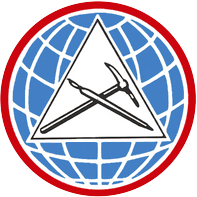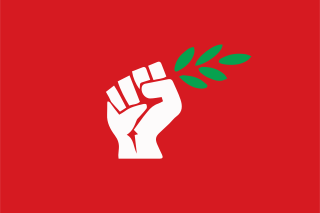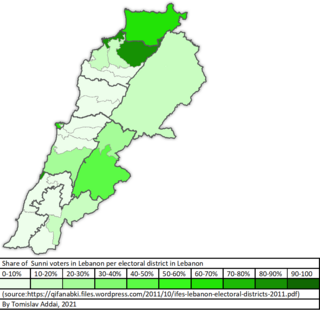Related Research Articles

The Progressive Socialist Party is a Lebanese political party. Its confessional base is in the Druze sect and its regional base is in Mount Lebanon Governorate, especially the Chouf District. Founded by Kamal Jumblatt in 1949, the party was led by his son Walid Jumblatt between 1977 and 25 May 2023. On 25 June 2023 the son of Walid Taymur Jumblatt was officially consecrated as leader of the PSP.

Camille Nimr Chamoun OM, ONC was a Lebanese politician who served as President of Lebanon from 1952 to 1958. He was one of the country's main Christian leaders during most of the Lebanese Civil War (1975–1990).

Elias Hrawi was a Lebanese politician who served as the 10th president of Lebanon from 1989 to 1998.
The Lebanese National Movement was a front of Leftist, pan-Arabist and Syrian nationalist parties and organizations active during the early years of the Lebanese Civil War, which supported the Palestine Liberation Organization (PLO). It was headed by Kamal Jumblatt, a prominent Druze leader of the Progressive Socialist Party (PSP). The Vice-President was Inaam Raad, leader of the Syrian Social Nationalist Party and Assem Qanso of the pro-Syrian Lebanese Arab Socialist Ba'ath Party. The general secretary of the LNM was Mohsen Ibrahim, leader of the Communist Action Organization in Lebanon (CAOL).

The presidentof the Lebanese Republic is the head of state of Lebanon. The president is elected by the parliament for a term of six years, which cannot be renewed immediately because they can only be renewed non-consecutively. By convention, the president is always a Maronite Christian who fulfills the same requirements as a candidate for the house of representatives, as per article 49 of the Lebanese constitution.

The Lebanese Communist Party is a communist party in Lebanon. It was founded in 1943 as a division of the Syrian–Lebanese Communist Party into the Syrian Communist Party and the Lebanese Communist Party; but the division was only implemented in 1964.

The March 14 Alliance, named after the date of the Cedar Revolution, was a coalition of political parties and independents in Lebanon formed in 2005 that were united by their anti-Syrian stance and by their opposition to the March 8 Alliance. It was led by Saad Hariri, Walid Jumblatt and Samir Geagea, as well as other prominent figures.

The Popular Nasserist Organization – PNO is a Sidon-based Nasserist party originally formed in 1973 by Maarouf Saad, a Sunni Muslim pan-Arab politician and member of Parliament (MP) later killed by the Lebanese Army during a February 1975 dock strike held in that port city.
The Lebanese Forces – Executive Command or LFEC, was a splinter group from the Lebanese Forces led by Elie Hobeika, based at the town of Zahlé in the Beqaa valley during the late 1980s. It was initially founded in January 1986 under the title Lebanese Forces – Uprising or LFU, but later changed its designation.

The Toilers League, also designated the Workers League is a Lebanese left-wing political party founded in Lebanon at the late 1960s and currently led by former Chouf MP Zaher el-Khatib.

Lebanese Sunni Muslims refers to Lebanese people who are adherents of the Sunni branch of Islam in Lebanon, which is one of the largest denomination in Lebanon tied with Shias. Sunni Islam in Lebanon has a history of more than a millennium. According to a CIA 2018 study, Lebanese Sunni Muslims constitute an estimated 30.6% of Lebanon's population.

General elections were held in Lebanon on 6 May 2018. Although originally scheduled for 2013, the election was postponed three times in 2013, 2014 and 2017 for various reasons, including the security situation, the failure of the Parliament to elect a new President, and the technical requirements of holding an election. A new electoral law adopted in 2017 provides a proportional representation system for the first time.

Hussein Al Oweini was a Lebanese businessman and politician who served as Prime Minister of Lebanon twice. He also held other cabinet positions.
Nazira Jumblatt (1890–1951) was a Druze leader and the mother of Lebanese politician and Kamal Jumblatt. She was styled sitt.
Mohsin Ibrahim, kunya Abu Khaled, was a Lebanese politician. He was a prominent personality of the Lebanese and Arab left. Initially a Nasserist nationalist, he later turned to Marxism and became the leader of the Communist Action Organization in Lebanon (OACL). As the head of OACL, he played key roles in the building of alliances during the Lebanese Civil War.

The first cabinet of Rafic Hariri was the 61st government and one of the post-civil war governments of Lebanon. It was inaugurated on 31 October 1992 replacing the cabinet led by Rachid Solh.
Bishara Merhej is a Lebanese journalist and politician who held various cabinet posts, including minister of interior. He also served at the Lebanese parliament in the 1990s.
Bahij Tabbara is a Lebanese jurist and politician who held various cabinet posts and was a member the parliament of Lebanon. He was among the close allies of Rafik Hariri.
Nicholas Fattoush is a Lebanese lawyer and politician who served in various cabinet posts, including minister of tourism. He was also member of the Lebanese Parliament.
References
- 1 2 3 4 5 6 7 8 9 10 11 12 "محسن دلول" (in Arabic). Abjjad. Retrieved 12 July 2022.
- 1 2 Who's Who in Lebanon (19th ed.). Beirut: Publitec Publications. 2007. p. 102. doi:10.1515/9783110945904.476. ISBN 978-3-598-07734-0.
- 1 2 3 4 "محسن دلول عميد المخبرين السوريين في لبنان". Elaph (in Arabic). 14 June 2005. Retrieved 12 July 2022.
- ↑ Nora Boustany (7 January 1984). "U.S. Turns Down Lebanese Proposal for Redeploying Marines". The Washington Post . Retrieved 12 July 2022.
- ↑ A. Nizar Hamzeh (1993). "Lebanon's Hizbullah: From Islamic Revolution to Parliamentary Accommodation". Third World Quarterly . 14 (2): 331. doi:10.1080/01436599308420327.
- ↑ Ward Vloeberghs (2015). Architecture, Power and Religion in Lebanon. Rafiq Hariri and the politics of sacred space in Beirut. Vol. 114. Leiden; Boston: Brill. pp. 381–382. doi:10.1163/9789004307056_010. ISBN 9789004307056.
- ↑ Fawwaz Traboulsi (2012). A History of Modern Lebanon (2nd ed.). London: Pluto Press. pp. 205–206. doi:10.2307/j.ctt183p4f5. ISBN 9780745332741. JSTOR j.ctt183p4f5.
- ↑ "Former Lebanese Defense Minister Mohsen Dalloul Says He Wants Iran to Have Nuclear Weapons". MEMRI. 17 October 2010. Retrieved 12 July 2022.
- ↑ "Nouvelles sociétés". Le Commerce du Levant (in French). 1 September 2005.
- ↑ Gary C. Gambill (January 2003). "Lebanon's Cell Phone Scandals". Middle East Intelligence Bulletin. Vol. 5, no. 1. Retrieved 12 July 2022.
- ↑ Fawwaz Traboulsi (2014). "Social Classes and Political Power in Lebanon". Beirut: Heinrich Böll Foundation - Middle East. p. 112. Retrieved 18 May 2024.
- ↑ Rory Mcmillan (2001). "Telecommunications Reform in the Eastern Mediterranean: Jordan, Egypt, Lebanon and Syria". The Middle East and North Africa Legal Yearbook. 2001.
- ↑ James Exelby (August 1998). "The Post-War Reconstruction of the Telecommunications Sector in Lebanon". JIME Review. August 1998.
- ↑ "دلول، محسن". WorldCat Identities. Retrieved 12 July 2022.